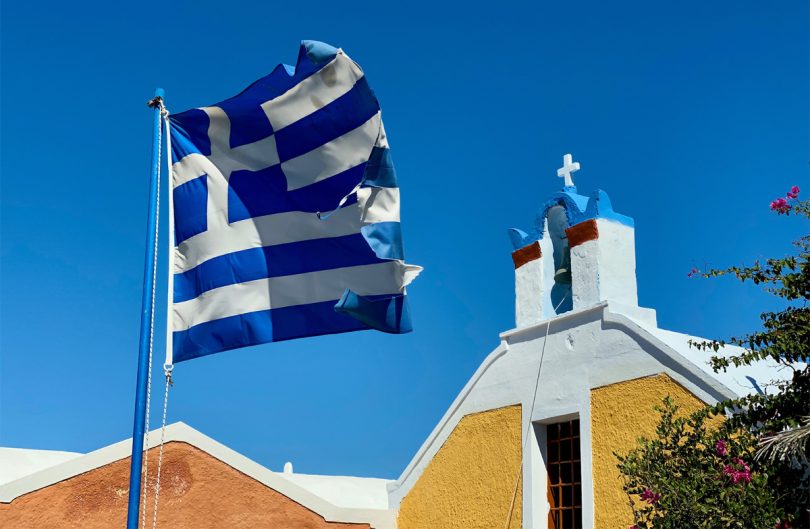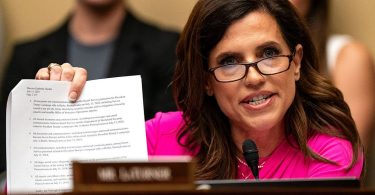25 January 2024
DAVID I KLEIN
Istanbul, Turkey
RNS
At the World Economic Forum in Davos last week, Greek President Kyriakos Mitsotakis announced that legislation to allow same-sex couples to marry will be approved by the parliament in Athens by the middle of February.
Citing his government’s support for equality but also “the rights of the children that already exist,” Mitsotakis called marriage for same-sex couples “a fact, it is reality, and ultimately I think that this must be the result of legislation of the Hellenic Parliament.”
The Greek flag flies outside a Greek Orthodox Church in Santorini, Greece. PICTURE: iSAW Company/Unsplash/Creative Commons
But the bill is testing another longstanding reality in Greek public life: the influence of the Greek Orthodox Church, which is vociferously opposing the idea of legalizing marriage for anyone but traditional heterosexual couples.
“The bill abolishes not only rules of bioethics, Christian values and the Greek family tradition, but it overturns the rights of future children and gender roles as elements of the cohesion of society,” said a church statement on Tuesday, after a meeting of its bishops called to voice their objections to the law.
“The bill abolishes not only rules of bioethics, Christian values and the Greek family tradition, but it overturns the rights of future children and gender roles as elements of the cohesion of society.”
– A statement from the Greek Orthodox Church
The Greek constitution recognises the Eastern Orthodox Church as the “prevailing religion” of the state, and several government departments, most prominently the Ministry of Education, are inextricably tied with the Orthodox hierarchy.
But the bill itself is evidence that the church’s influence has waned in recent years, according to Thanasis Koukakis, a Greek journalist and scholar of theology who’s been covering the issue for years.
“The larger society has this perception that the church is part of our culture, they have the perception that the church is something that helps Greek society in certain conditions or circumstances,” Koukakis told RNS. “But there’s not the spiritual connection that there used to be in the decades before 1980.”
People raise placards as they participate in the annual Pride parade, in Athens, on 10th June, 2023. PICTURE: AP Photo/Yorgos Karahalis/File photo.
While more than 90 per cent of Greeks identify as Greek Orthodox, only 55 per cent of Greek adults said that religion is an important part of their lives, according to a 2018 pew study. Church attendance is also in significant decline.
Koukakis recalled that when he was younger, in the early 1990s, the church was able to mobilise massive protests over issues like removing religion from Greek identity cards, but those days are long gone.
“The influence of the Greek church in Greek society and the Greek political system is much more weak, compared to 30 or 40 years ago,” Koukakis said. “Right now, the Greek church cannot really do anything specific in order to stop the Greek administration.”
But the church in its statement on the bill relied less on its authority than on a social argument, saying the subject of marriage “concerns everyone, even if they do not accept Christian ethics.”
“The initiators of the bill and its supporters promote the abolition of fatherhood and motherhood and their transformation into neutral parenthood, the disappearance of gender roles within the family and put before the interests of future children, the sexual choices of homosexual adults,” the statement read.
The church also seemed to recognise that it could not dictate policy, but neither could it sit on the sidelines of the debate.
“Obviously the State legislates, but this parameter neither deprives the Church of freedom of speech, nor relieves the Church of the duty of informing the faithful people, nor can it indicate what sin consists of,” the bishops wrote, adding, “If he remains silent, however, he bears a heavy responsibility and destroys himself.”
Mitsotakis responded to the church’s opposition in a cabinet meeting Wednesday.
“We heard the views of tradition, evolution, but also our side, which I believe includes tradition in evolution,” he said. “I also accept the positions of the church, which I absolutely respect…However, I want to be clear here: we are referring to state choices. Not in theological beliefs. And in the past, after all, with the Church we had different perspectives on civil marriage, on the cremation of the dead, on the issue of identities.”
Parts of the Acropolis are covered in snow as the Parthenon temple stands atop of the ancient hill, after a snowfall, in Athens, Greece, on Monday, 6th February, 2023. PICTURE: AP Photo/Thanassis Stavrakis.
Elsewhere, Mitsotakis has stressed that approving the bill will bring Greece into line with the rest of the European Union. Greece will become the 15th EU member state to enact marriage equality into law.
In 2015, Greece acknowledged same-sex civil unions, but proponents of the new legal framework noted that the civil union law did not give partners the same parental or adoption rights as opposite-sex couples.
The church’s opposition hasn’t fallen entirely on deaf ears. Though the bill is being introduced by Mitsotakis’ right-leaning coalition, it has split his bloc in the parliament in Athens, with some 60 of his party’s 158 parliamentarians indicating that they will abstain.
Stefanos Kasselakis, head of the opposition Syriza Party and the first openly gay party leader in Greece, has declared that he will be enforcing complete party discipline to vote in favour of the bill.
We rely on our readers to fund Sight’s work – become a financial supporter today!
The debate over the law is having an impact on Greek Orthodox communities outside of the country. In a visit last weekend to Mount Athos, home to several monasteries and a holy site in the Greek Orthodox tradition, Archbishop of America Elpidophoros was expected to get a chilly welcome from the monks, likely due to his decision in 2022 to baptise the adopted child of a same-sex couple.
Anticipating the meeting, Ecumenical Patriarch Bartholomew of Constantinople, the Greek Church’s highest authority, reportedly sent the monks a letter urging them to treat Elpidophoros with all due honors.
Elpidophoros told reporters Wednesday that he felt no hostility during the visit, saying, “We received an official and warm welcome from five Athonite monasteries, strictly adhering to the Athonite protocol, without encountering any issues,” according to eKathimerini.
He added that the debate over the law was an internal issue separate from his American Greek Orthodox community.
“Greece has its own ecclesiastical authority, its own ecclesiastical administration,” he said, adding, “I believe it is not appropriate for me to express any different opinion. In America, we face different circumstances, different situations, a different ecclesiastical authority.”






